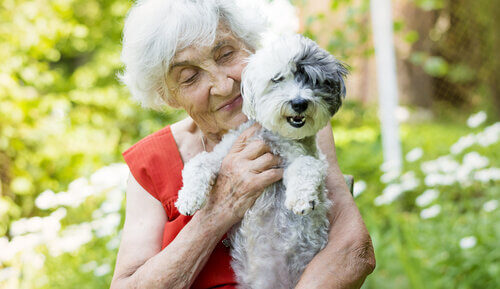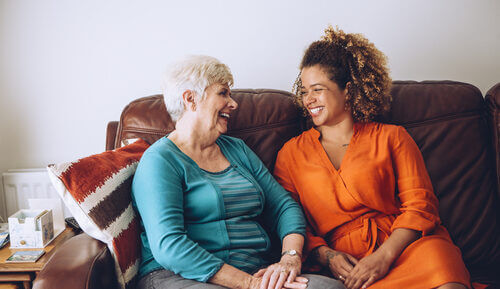
Receiving a dementia diagnosis can be an emotional and worrying time, and thinking about how you’re going to tell people you have dementia can add additional pressure to the situation.
If you are worried about telling your loved ones, you’re not alone. Research shows that almost a quarter of people living with dementia say that some of their friends don’t know about their diagnosis and around 37 per cent haven’t shared the news with their neighbours.
Should you tell people you have dementia?
Whether or not you share your diagnosis with other people is a completely personal decision, but there are benefits to being open about it, despite how difficult that initial conversation can be.
Sharing your dementia diagnosis with your loved ones can help by:
- Relieving pressure from you – if your behaviours are changing or you’re unable to carry out tasks as before, it can be challenging to hide this from the people around you and you’re likely to start being asked questions as time goes on. Sharing your diagnosis with others will help them to better understand any changes in behaviour and prevent you from worrying too much about how you’re being perceived.
- Opening the door for support – it can be difficult to ask for help, but once the people around you know about your diagnosis, it will come more naturally to them to offer support.
- Breaking down the stigma – despite almost a million people living with dementia in the UK and over half of people reporting that they know somebody with the condition, research shows that almost 25 per cent of people would find it difficult to speak to somebody with dementia. Being open will help others to see that someone living with dementia is still the same person as they were before the diagnosis.
Learning about your dementia diagnosis may bring relief
If you’ve been experiencing symptoms for a while before your diagnosis, it might even be the case that people already had their suspicions, especially those who are closest to you. Learning about the diagnosis can come as a relief in many ways for your loved ones, providing an explanation for any changes in behaviour and making it possible to face the challenges ahead together.
Bear in mind that there are some people or authorities that you are legally required to inform of your dementia diagnosis. This includes the DVLA, or the DVA if you are in Northern Ireland, and your car insurance provider.
Depending on the policies in place, you may also be required to tell your employer you have dementia.
Tips for telling people you have dementia
1. Wait until you’re ready
There are no set guidelines for sharing your diagnosis, including who you should tell or when and how you should tell them. As with many things in life, following your own instinct is the best way forward.
Depending on your symptoms and how they manifest, there may come a natural point when it makes sense to tell more people that you are living with dementia, but it is ultimately up to you when the right time is.
You might consider staggering the people you share the news with; starting with your closest friends and family and then waiting a little longer to tell others so that it doesn’t feel so overwhelming.
However you choose to tell people about your diagnosis, being at a point where you are accepting of the situation will help to make the process easier for you.
2. Be prepared for questions
A dementia diagnosis is tough for everybody involved, and just like you probably did when you were first told, people are likely to have questions.
Although it’s not your job to educate others about dementia, it could be worthwhile to share how you are feeling and how the condition is affecting you in the current moment.
Since people living with dementia have different experiences, being open and honest about your personal experience may help to answer people’s questions and avoid them jumping to conclusions based on any preconceptions they have about the condition.
3. Write things down
When you initially received your dementia diagnosis, there was probably a lot of information to take in, perhaps including medical terms or explanations that you find difficult to relay accurately to others.
Writing down the details of your diagnosis will make it easier to recall the key information and explain things more confidently.
Try to take note of:
- The type of dementia you have been diagnosed with
- The current symptoms
- How symptoms are likely to progress
Formal appointments can be overwhelming, often making it difficult to take in information. These notes may also be good for you to look back on in the future.
4. Choose a comfortable setting
Although it may sound superficial, the environment can have a huge impact on how a conversation pans out. For example, if you arrange to meet your friend in a local café but it’s especially busy that day, you may feel uncomfortable or fearful about your conversation being overheard by others, potentially causing you to miss out details or choosing not to approach the subject at all.
Selecting a place where you feel comfortable and there are minimal risks of being disturbed will help the chat to run more smoothly. If you’re comfortable, inviting a loved one over to your house may be the best idea, it’s somewhere you feel relaxed and also in control, giving you more autonomy over the situation.
5. Be prepared for mixed reactions
Whilst it’s not your job to comfort people, preparing for a mix of responses will help you to better react to any negative comments about your dementia diagnosis.
Try to remember that any negative comments will be coming from a place of love and care for you, your loved ones are likely to feel upset and anxious about what the future holds. It may take time for people to accept the news, so give them, and yourself, time for it to sink in and work through it together.
Dementia affects people in many, many different ways. The advice above may not be relevant for you or your loved one, and for some, the condition may have progressed far enough that sitting down to share the diagnosis with friends and family isn’t a feasible option. But it’s worth bearing in mind that most things are easier to work through with the support of those around you.
On our website we have a range of advice articles to help you through the dementia journey, no matter which stage you are at.
There are also helplines available if you feel you need support:
Alzheimer’s Society Dementia support line:
Phone: 0333 150 3456
Admiral Nurse Dementia Helpline
Phone: 0800 888 6678
Email: helpline@dementiauk.org


